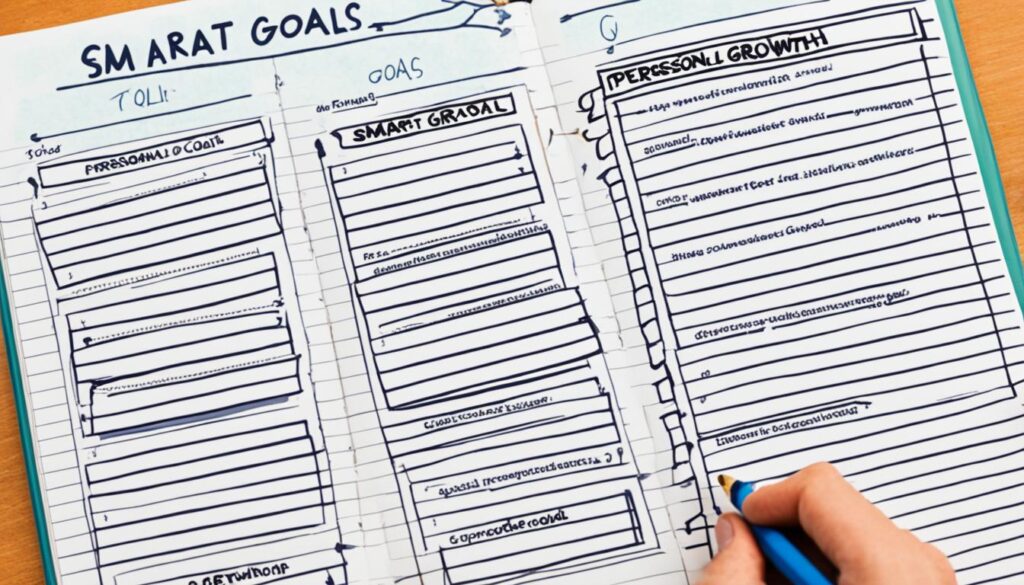Achieve More: Smart Goals Examples for Students

Are you ready to take your academic journey to the next level? Do you want to improve your performance, maximize your potential, and achieve your goals? Setting SMART goals could be the key to unlocking your success.
Sometimes, it can feel overwhelming to navigate the world of academics and personal growth. That’s why having a clear roadmap is crucial. SMART goals provide a framework that enables you to set specific, measurable, achievable, relevant, and time-bound objectives.
But what exactly are SMART goals and how can they benefit you as a student? In this article, we will explore various examples of SMART goals for students, ranging from academic performance to personal growth and career preparation.
Key Takeaways:
- Setting SMART goals is a valuable practice for students at all levels.
- SMART goals help improve time management, track progress, and achieve academic and personal aspirations.
- Examples of SMART goals for students include improving academic performance, increasing organization and time management, and learning a new language.
- SMART goals empower students to create clear action plans and work towards success in their academic journey.
- By setting SMART goals, students can maximize their potential and achieve more than they ever thought possible.
Setting SMART Goals for Academic Success
When it comes to achieving academic success, setting SMART goals is crucial. SMART goals are specific, measurable, achievable, relevant, and time-bound. Tackling your educational journey with a clear roadmap in mind helps you stay focused, motivated, and on track. Here are some examples of SMART goals for students:
Goal 1: Improve Academic Performance
If you aim to improve your academic performance, set a specific GPA target for yourself. For example, you might set a goal to achieve a GPA of 3.5 or above by the end of the semester. This goal is measurable, as you can track your progress easily by reviewing your grades. It is also achievable and relevant to your academic success.
Goal 2: Enhance Organization
To improve your organization skills, create SMART goals related to planning and note-taking. Dedicate a specific amount of time each day for planning your tasks and organizing your study materials. This goal is achievable and time-bound, as you can set aside 30 minutes each day for organizing. By staying organized, you can enhance your productivity and stay on top of your assignments and deadlines.
Goal 3: Increase Class Participation
If you want to become more engaged in class, aim to contribute a certain number of times each week. For example, set a goal to ask at least two questions or make two comments during each class session. This goal is specific and measurable, as you can track the number of times you actively participate. It is also relevant to your personal development and academic success, as active class participation can deepen your understanding of the subject matter.
By setting SMART goals like these, you can create a clear vision of what you want to achieve academically and develop a plan of action to get there. Stay focused, motivated, and persistent in pursuing your goals, and you’ll experience the satisfaction of achieving academic success.
| Goal | Description |
|---|---|
| Improve Academic Performance | Set a specific GPA target |
| Enhance Organization | Dedicate dedicated time for planning and note-taking |
| Increase Class Participation | Aim to contribute a certain number of times each week |
SMART Goals for Personal Growth
While SMART goals are commonly associated with academic achievements, they are also incredibly valuable for personal growth and development. By setting SMART goals in various areas of your life, you can strive for self-improvement and create habits that will benefit you beyond your academic journey. Here are some examples of SMART goals for personal growth:
- Improving reading level: Dedicate at least 30 minutes each day to reading extracurricular material and aim to complete a certain number of books by the end of the semester.
- Increasing sleep duration: Establish a consistent sleep routine and aim to get a minimum of 7-8 hours of sleep each night.
- Enhancing overall productivity: Create a goal-setting worksheet for students and plan your daily tasks and responsibilities to maximize productivity and stay organized.
By committing to these specific actions, you can make steady progress in areas that contribute to your personal growth and well-being. Motivate yourself by tracking your achievements and celebrating every milestone. Remember, SMART goals are not limited to academics – they empower you to create a well-rounded and successful student experience.

SMART Goals for Language Learning
Learning a new language is an invaluable skill that college students can develop to broaden their horizons and enhance their future career prospects. By setting SMART goals, you can make steady progress in your language acquisition journey and measure your proficiency along the way.
One example of a SMART goal for language learning is dedicating a specific amount of time each day to practice. Whether it’s 30 minutes or an hour, consistent practice allows you to immerse yourself in the language and reinforce your learning. By setting aside this dedicated time, you can develop your skills and build a strong foundation.
Another example is aiming to have a conversation in the target language within a certain time frame. This goal encourages you to actively engage with native speakers or language exchange partners, applying what you’ve learned in real-life scenarios. It boosts your confidence and helps you develop fluency and conversational skills.
SMART goals provide structure and accountability to your language learning journey. They allow you to track your progress, identify areas for improvement, and celebrate your achievements along the way. Whether your goal is to become proficient in a language for personal enrichment or to enhance your career prospects in an increasingly globalized world, setting SMART goals is a powerful strategy to make the most of your language learning experience.

Benefits of Setting SMART Goals for Language Learning
- Clear direction: SMART goals provide a clear roadmap for your language learning journey, ensuring that you stay focused and motivated.
- Measurable progress: By setting specific and measurable goals, you can track your progress and see how far you’ve come.
- Accountability: SMART goals hold you accountable and make you more likely to stick to your language learning routine.
- Adaptability: Setting time-bound goals allows you to adjust your learning strategies and prioritize your efforts effectively.
- Enhanced motivation: Working towards SMART goals gives you a sense of purpose and achievement, fueling your motivation to continue learning and improving.
| SMART Goal | Description |
|---|---|
| Dedicate 30 minutes every day to language learning | Set aside a specific time slot each day to focus on your language studies, ensuring consistent and dedicated practice. |
| Have a 10-minute conversation in the target language with a native speaker within 3 months | Actively engage with the language by seeking out opportunities to practice conversational skills, such as language exchange programs or conversation partners. |
| Complete a language proficiency exam and achieve a specific score within 6 months | Set a specific target score for a language proficiency exam and create a study plan to prepare for the exam effectively. |
By setting SMART goals for language learning, you can make steady progress, stay motivated, and achieve fluency in your desired language. Remember to break down your larger goals into smaller, manageable tasks and celebrate each milestone along the way. With dedication, consistency, and a SMART goal mindset, you’ll unlock the benefits of language learning and open doors to new opportunities in your personal and professional life.
SMART Goals for Academic Writing
Developing strong academic writing skills is essential for success in college. By setting SMART goals, you can improve your writing abilities and achieve higher grades on essays and papers. SMART goals provide a clear framework for focused improvement and measurable progress.
Examples of SMART Goals for Academic Writing
Here are some examples of SMART goals that can help you enhance your academic writing:
- Implement feedback: Aim to get a higher grade on a specific essay by implementing the feedback you received from previous assignments. This could involve addressing areas of improvement such as grammar, structure, or supporting evidence.
- Set a deadline: Establish a specific deadline for completing an upcoming essay. This will help you manage your time effectively and avoid last-minute rushes, allowing for thorough research, planning, and revision.
- Expand vocabulary: Set a goal to incorporate a specific number of new vocabulary words into each essay or paper. This will help you improve the clarity and sophistication of your writing.
By setting SMART goals for academic writing, you can focus on continuous improvement and produce high-quality work that showcases your knowledge and abilities.

SMART Goals for Academic Writing
| SMART Goal | Description |
|---|---|
| Implement feedback | Aim to improve essay grades by incorporating feedback from previous assignments. |
| Set a deadline | Establish a specific timeline for completing essays to ensure thorough research and revision. |
| Expand vocabulary | Incorporate a set number of new vocabulary words into each piece of writing to enhance clarity and sophistication. |
By setting meaningful, measurable, achievable, relevant, and time-bound goals for academic writing, you can enhance your skills, communicate your ideas effectively, and achieve academic success.
SMART Goals for Time Management
Effective time management is essential for high school students to thrive academically and maintain a healthy work-life balance. By setting SMART goals related to time management, students can prioritize their tasks, avoid procrastination, and maximize productivity. Here are some examples:
1. Allocate Dedicated Study Time
Set a specific schedule for studying each day and commit to allocating dedicated time to focus on your academic tasks. This will help you stay on top of assignments, review materials, and prepare for exams. Utilize time-blocking techniques to create a structured study routine and ensure that you make the most of your study sessions.
2. Create a Consistent Study Schedule
Establish a consistent study schedule that aligns with your personal preferences and energy levels. Determine the best times of the day when you are most alert and focused, and dedicate those periods to studying. Consistency will help you build discipline and make studying a habit.
3. Prioritize Tasks
Create a to-do list or use a digital task management tool to prioritize your assignments, projects, and extracurricular activities. Identify the most important tasks that require immediate attention and tackle them first. This will help you avoid feeling overwhelmed and ensure that critical deadlines are met.
4. Avoid Procrastination
Procrastination can derail your time management efforts and lead to increased stress levels. Set a goal to overcome procrastination by breaking larger tasks into smaller, manageable chunks. Use techniques such as the Pomodoro Technique (working in focused bursts followed by short breaks) to stay motivated and maintain momentum.
5. Maintain a Healthy Work-Life Balance
Recognize the importance of balancing academics with other aspects of your life, such as hobbies, physical activity, and socializing. Set goals to dedicate time each week to activities that bring you joy and relaxation. This will help prevent burnout and ensure a well-rounded high school experience.
| SMART Goal | Actions | Benefits |
|---|---|---|
| Allocate Dedicated Study Time | Create a study schedule and use time-blocking techniques. | Improved focus, better preparedness for exams and assignments. |
| Create a Consistent Study Schedule | Establish a regular study routine aligned with personal preferences. | Build discipline, make studying a habit. |
| Prioritize Tasks | Create a to-do list and prioritize assignments and projects. | Effective time management, reduced stress, meeting deadlines. |
| Avoid Procrastination | Break tasks into smaller parts, utilize the Pomodoro Technique. | Increased productivity, reduced stress from last-minute rushing. |
| Maintain a Healthy Work-Life Balance | Dedicate time to hobbies, physical activity, and socializing. | Prevent burnout, holistic development. |

By setting SMART goals for time management, you can set yourself up for success and become a more efficient and balanced high school student. Prioritize your tasks, stick to a consistent study schedule, and avoid procrastination. Remember, effective time management not only enhances your academic performance but also allows you to enjoy a fulfilling high school experience.
SMART Goals for College and Career Preparation
College and career preparation is a crucial phase in every student’s educational journey. By setting SMART goals, you can create a clear roadmap toward your long-term aspirations and take the necessary steps to achieve your desired outcomes. Here are some examples of SMART goals for college and career readiness:
- Apply to at least three colleges or universities within the next six months.
- Attend at least two open days to explore different college options and programs.
- Meet with a career advisor to gain insights into potential career paths and develop a career plan.
- Secure an internship or part-time job in your desired field to gain practical experience and build professional connections.
Setting SMART goals for college and career preparation allows you to stay focused, make informed decisions, and actively work towards your future success. It provides a structured approach to navigating the college application process, exploring career options, and gaining valuable experience in your chosen field.
Take Control of Your Future
By setting goals that are specific, measurable, achievable, relevant, and time-bound, you empower yourself to take control of your educational journey. SMART goals for college and career preparation set you up for success not only during your time in college but also after graduation. They help you develop the skills, knowledge, and experiences necessary to excel in your chosen career path.
| Benefits of Setting SMART Goals for College and Career Preparation |
|---|
| 1. Provides clarity and direction in your college and career choices |
| 2. Helps prioritize your actions and make efficient use of your time and resources |
| 3. Keeps you motivated and focused on achieving your long-term aspirations |
| 4. Enhances decision-making skills by considering the specific criteria set in your goals |
| 5. Creates a sense of accountability and trackable progress |
Remember, your college and career journey is unique to you, and setting SMART goals enables you to tailor your actions and decisions to align with your individual aspirations. Whether it’s applying to your dream college, exploring different majors, or building a strong professional network, SMART goals for college and career preparation pave the way for a successful and fulfilling future.
Conclusion
Setting SMART goals is a powerful tool for students to achieve academic success, personal growth, and college and career preparation. By following the SMART framework, students can create goals that are specific, measurable, achievable, relevant, and time-bound. SMART goals provide structure, accountability, and direction, helping students stay focused, motivated, and on track towards their desired outcomes.
Whether it’s improving academic performance, increasing organization, learning a new language, or preparing for college and careers, SMART goals empower students to take control of their educational journey and achieve more. By setting specific targets and creating action plans, students can overcome challenges, make progress, and accomplish their goals.
Remember that setting SMART goals is just the first step. It’s important to regularly review and evaluate your goals, adjusting them as needed to stay aligned with your aspirations. Stay committed, stay determined, and believe in your ability to succeed. With SMART goals as your guide, you have the tools to transform your dreams into reality and make the most of your student experience.






